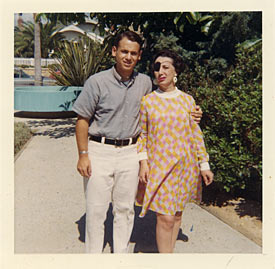March 26, 2005
On Death and Waiting
Despite Terry Schiavo’s parents’ efforts to keep her alive and despite Congress’ deplorable actions, we wait.
Waiting for a loved one to die is a time full of anticipation. Waiting for them to pass —no euphemism can adequately describe that feeling. It’s so personal and so intimate, which makes the government circus surrounding Ms. Schiavo’s end-of-life so sad.
I remember another waiting.
• • •

My Mother and Me in the Late 1960s
In 1960 when I was eleven my mother was diagnosed with a brain tumor. It was benign but the operation to remove it changed our lives forever. A once vibrant and beautiful woman became an invalid. She lost her sense of balance and had to walk with assistance. Her whole right side no longer functioned. Her right eye didn’t blink and had to be sewn shut. When she smiled, it was only a half smile.
But most of all, her mind felt muddled. As she described it, she was in a constant fog. She had to rely on others for everything. She had to rely on us for everything. The tumor didn’t kill her but it killed any semblance of normalcy we had as a family.
My younger sister and I had to grow up fast. My father became the sole caregiver for the three of us. The frustration, tension, and dysfunctionality of a long-term illness produced a grief that settled into our lives. There were no family social workers back then, only shock therapy.
Years later I went back to my old neighborhood to see the street and house where I spent those years. I saw a neighbor raking her leaves and stopped the car. “Do you remember me?” I asked. She invited me in for some tea. “We knew what was happening. But there wasn’t anything we could do.” she said as soon as we sat down.
Nine years after my mother’s operation she got lymphoma. Unrelated to her brain tumor this was terminal. My father and sister picked me up at the airport as I arrived back home from college that Christmas vacation. As we pulled out of the airport he veered towards the beach. “Let’s take a walk,” he said.
A walk in the sand was totally out of character for Dad. He was a methodical mathematician, not a romantic. We stopped at a large rock where he asked us to sit down.
“Your mother is dying…” She had maybe six months to live. “…and you are not allowed to tell her,” my father warned. He and her doctor had decided it was in her best interests to keep this from her. They were afraid she’d commit suicide. As it does now, America had a difficult time coping with death. When emotions fail you, seek other means. This was anything but neat and tidy.
I decided right there not to return to school after the holiday break. I couldn’t imagine leaving my mother. But my father vetoed that idea. So three weeks later I stood on our front porch saying “see you later.” I kissed her one last time and she whispered, “I will miss you.”
I wear that moment around my neck everyday. My mother thought I was just going back to college. But I was leaving her forever. And I couldn’t even say goodbye. It continues to be the hardest day of my life.
As it turned out, she lived for two and a half more years. I graduated college and returned home to attend graduate school. I was able to see her again but by this time she was in a long-term facility. Her lungs were being drained daily of fluid. And we never talked about her death. We never acknowledged it. I regret I was too young and too afraid of my father’s rage should I broach the subject.
But I knew she knew. On her final day she decided not to have her lungs drained. She made that decision. She lived to see her 25th wedding anniversary but decided not to wait for her 50th birthday. She made the decision when to go. It was a time before living wills. And even though technology could keep her alive we all finally agreed, albeit tacitly, it was time to go and let go.
I laid in my bed that night wondering if “it” had happened. Suddenly I remembered I hadn’t said goodbye, but then realized I had said it to her years before on that porch. We were really ready for this moment.
• • •
I understand what Michael Schiavo and Robert and Mary Schindler have struggled with these last fourteen years. Their differences are very personal and private. We know what’s going on but we are at a loss as to how to help.
We are at a loss and perhaps that’s just the way it should be.
![]() [ Terry Schiavo ]
[ Terry Schiavo ]
View Most Recent Story![]() :::
:::![]() Notify me when there's a new missive!
Notify me when there's a new missive!


 ShareThis
ShareThis